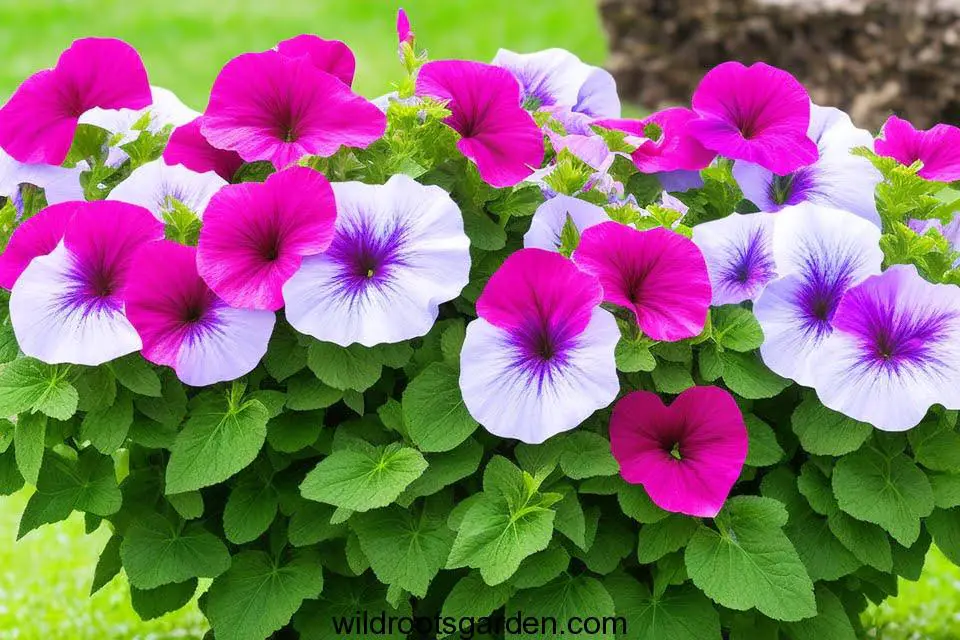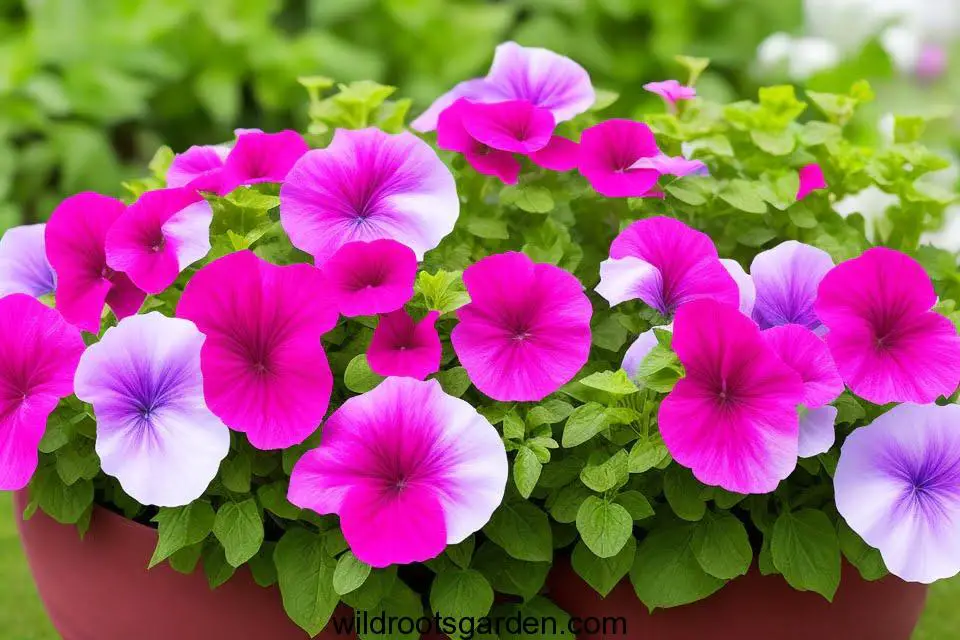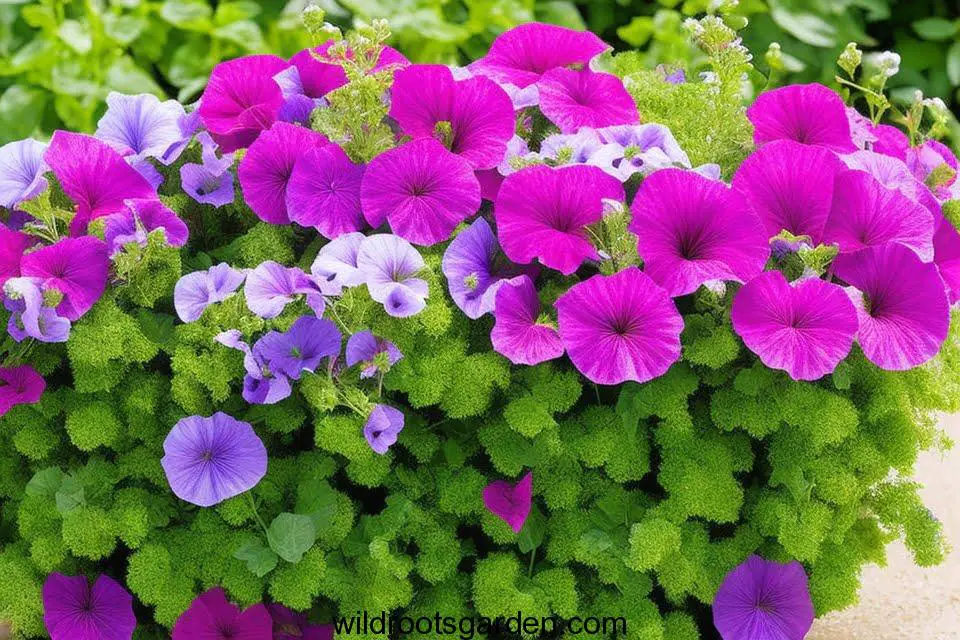Are Coffee Grounds Good for Petunias? Gardeners and plant lovers have been looking for alternative strategies to promote the growth and vitality of their cherished flora in recent years. One such fascinating custom is the use of coffee grounds as organic petunia fertilizer. Coffee grounds, a common waste product in many homes and coffee shops, have drawn interest for their possible advantages in gardening. Petunias are a well-liked option for enhancing the beauty of gardens and landscapes because of their bright and delicate flowers.
This introduction looks at the potential advantages of adding coffee grinds to petunia soil. It will examine the scientific rationale for this technique, assess how coffee grounds affect petunia development, and go over the best ways to use them. We intend to give gardeners useful tips on how to care for their petunias naturally and repurpose coffee waste in a sustainable way by shedding light on this eco-friendly gardening strategy.

Petunias are colorful and lovely flowers that are frequently used in containers, hanging baskets, and gardens. If you’re a gardener, you might be interested in learning how to improve the growth and health of your petunias naturally and sustainably by using coffee grounds. Before introducing coffee grounds into your gardening routine, it’s crucial to grasp the potential advantages and considerations. Coffee grounds are known for their high nitrogen content and organic matter.
JUMP TO TOPIC
Understanding Petunias
Let’s first learn more about petunias and coffee grinds before digging into their special characteristics. The Solanaceae family of plants includes petunias, which are distinguished by their trumpet-shaped blooms that come in a range of hues, including vivid pinks, purples, and whites. They are a great choice for gardens and containers since they do well in full light and soil that drains properly.
Coffee Grounds as Organic Matter
Rich in organic content, coffee grinds can enhance the general health of the soil. Coffee grounds slowly decompose after being placed into the soil, releasing vital nutrients and enhancing its structure. Adding organic matter, such as coffee grounds, might assist produce a beneficial growing environment because petunias need soil that drains well.

Nutritional Benefits of Coffee Grounds
Many nutrients included in coffee grinds can help petunias develop. The development of healthy plants depends on the macronutrients potassium, phosphorus, and nitrogen. The total nutrition of petunias depends on trace elements like magnesium, calcium, and iron, which are possible to find in coffee grounds.
Improving Soil Drainage
Soil drainage is a vital factor to take into account when cultivating petunias. Root rot and other diseases can be brought on by too much moisture. When combined with soil, coffee grounds can enhance drainage capabilities by breaking up compacted soil and enhancing water infiltration. Due to their preference for well-drained soil, petunias may benefit most from this.
Controlling Pests
It has been claimed that coffee grounds can keep common garden pests away. Coffee’s potent aroma has the power to deter insects like ants, snails, and slugs. Your petunias might be shielded from potential harm by these pests if you surround them with a barrier made of coffee grinds.
Coffee Grounds as Mulch
Mulching coffee grounds around petunias have a number of advantages. Mulching promotes soil temperature control, weed suppression, and moisture conservation. When utilized as mulch, coffee grinds can offer these benefits as well as increase the amount of nutrients in the soil over time.

Considerations for Using Coffee Grounds
While using coffee grounds in your gardening regimen will help petunias, there are a few things to keep in mind first.
Avoiding Excessive Use
You should only use a small amount of coffee grinds. Your petunias can suffer if you use too much coffee grounds since they can alter the pH and nutrient levels of your soil. When adding coffee grounds to the soil, it is advised to combine them with other organic materials or compost.
Acidic Soil Considerations
Because petunias and other plants that prefer acidic soil can benefit from the coffee grinds’ modest acidity. To avoid having overly acidic soil, it’s crucial to keep an eye on the pH levels if your soil is already acidic. You can maintain the ideal pH range for petunia development with regular soil testing.
Alternative Uses for Coffee Grounds
Apart from using coffee grounds directly in the garden, there are alternative ways to utilize them effectively:
- Composting: Coffee grounds are an excellent addition to compost piles, contributing to the decomposition process and enriching the resulting compost.
- Vermicomposting: Worms thrive on coffee grounds, making them a valuable addition to vermicomposting systems. The worms break down the coffee grounds, producing nutrient-rich vermicompost.
- Indoor plants: Coffee grounds can be used as a natural fertilizer for houseplants. They can be mixed with potting soil or sprinkled on the top layer to provide a nutrient boost.
***In conclusion, the use of coffee grounds as a fertilizer for petunias can indeed prove to be a valuable and eco-friendly gardening technique. As our exploration has shown, coffee grounds offer numerous advantages, including the enhancement of soil structure, nutrient enrichment, and pest-deterrent properties. When applied correctly and in moderation, coffee grounds can contribute to the overall health and vibrancy of petunias, leading to more robust and beautiful blooms.
However, it is important to use caution and avoid using coffee grounds excessively, since they may change the pH of the soil and perhaps result in nutrient imbalances. To create a balanced and fertile growing medium, it is important to mix coffee grounds with other compost elements.
Finally, gardeners may promote a flourishing flower show while also helping to manage waste in a sustainable way by embracing the practice of utilizing coffee grounds for petunias. Using this organic gardening method can be a gratifying path toward creating landscapes that are greener and more vivid while reducing our environmental impact. The following time you have a morning cup of coffee, consider how it can help you care for your prized petunias in an environmentally beneficial way.
FAQs
Q1: Can I use coffee grounds for all types of petunias?
Yes, coffee grounds can be used for various types of petunias, including grandiflora, multiflora, and multiflora varieties.
Q2: How often should I apply coffee grounds to my petunias?
It is recommended to apply coffee grounds to petunias once every two to three weeks during the growing season.
Q3: Can I use instant coffee grounds for my petunias?
Instant coffee grounds are less effective compared to freshly brewed coffee grounds. It is best to use fresh coffee grounds for optimal results.
Q4: Are there any petunia varieties that are sensitive to coffee grounds?
While coffee grounds are generally safe for petunias, some rare varieties may be more sensitive to changes in soil pH. It is advisable to monitor the specific needs of the petunia variety you are growing.
Q5: Can I use coffee grounds as a seed starter for petunias?
Coffee grounds are not suitable as a primary growing medium for petunia seeds. It is best to use a well-draining seed-starting mix for successful germination.

